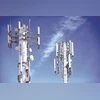The World Telecommunication Standardisation Assembly (WTSA 2024) has adopted two key resolutions proposed by India on digital public infrastructure (DPI) and artificial intelligence (AI).
The International Telecommunication Union (ITU) will now prioritise standardisation in these areas, both of which have been pushed by Prime Minister Narendra Modi.
The ITU, a specialised United Nations agency for information and communication technologies of which India is a part, conducts the WTSA every four years to plan its standardisation programme. Concluding on Thursday, the WTSA reviewed and modified existing guidance and agreed on six other new resolutions, all supported by India.
India had specifically pushed the global body to adopt a focussed approach towards DPI, a collection of technologies that promotes interoperability, openness and inclusion to deliver vital public and private services, including access to credit and marketing.
Key Indian DPI offerings such as Aadhaar, Unified Payments Interface (UPI) and other government run services part of the India stack including eKYC and Digilocker had been discussed at length at the WTSA, given the interest by developing economies in Africa.
“What was seen as a form of communication has today become the highway on which the future of not only our countries, but the future of humanity in the next decades will be building,” Telecom Minister Jyotiraditya Scindia said on the occasion.
More From This Section
Meanwhile, ITU Secretary General Doreen Bogdan-Martin pitched for stronger standards for AI that can help build trust safety and level the playing field for innovation. Internal surveys by ITU have pointed out 85 per cent of ITU’s 194 member states have no framework for AI.
“In collaboration with India, we are exploring ways to leverage ITU’s inclusive platforms to bring early research and prototypes to market, and to work with academic partners on the latest advancements in network technology,” Martin said.
The other resolutions adopted by WTSA include enhancing standardisation activities on sustainable digital transformation, promoting and strengthening metaverse standardisation, promoting and Strengthening Standardization Activities for Vehicular Communications and strategic planning in ITU telecom standardisation.
A provision of handset-derived caller location information for emergency communications and enhancing the engagement of next generation experts in ITU-T standardization activities was also supported by New Delhi.
The government believes India’s participation at the meetings is crucial for shaping global agendas in emerging technologies such as AI, 6G, Internet of Things, satellite communications, and Quantum computing
At WTSA, two expert groups were consolidated to create the new ITU-T Study Group 21 on technologies for multimedia, content delivery, and cable TV. A historic turnout of 3,700 delegates from over 160 countries made the latest WTSA the largest ever.
For Inclusive TechStandards to be created for:
- Technical requirements for DPI- Safe and inclusive AI- Trusted and interoperable metaverse applications- Sustainable digital transformation across industries
- Communication tech for intelligent transport systems
)